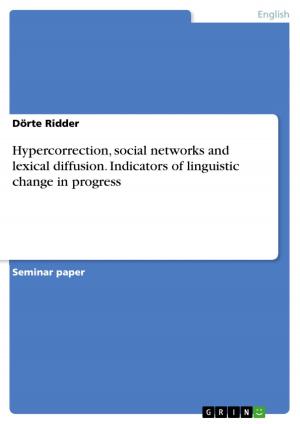| Author: | Alexander Keller | ISBN: | 9783638234177 |
| Publisher: | GRIN Publishing | Publication: | November 22, 2003 |
| Imprint: | GRIN Publishing | Language: | English |
| Author: | Alexander Keller |
| ISBN: | 9783638234177 |
| Publisher: | GRIN Publishing |
| Publication: | November 22, 2003 |
| Imprint: | GRIN Publishing |
| Language: | English |
Seminar paper from the year 2003 in the subject Business economics - Miscellaneous, grade: A, California State University, East Bay (-), course: Research Methods and Communication, 10 entries in the bibliography, language: English, abstract: Throughout my life I heard the famous phrase 'healthy body, healthy mind.' At least in Germany this phrase is quite common. But is there really a relationship, or do people just say it? In this context some might argue that being physical active does not contribute to the overall health at all. It is more what we eat that matters. They are right to some extent. However, according to Chryss Cada, staying in shape is always a balance between exercise and nutrition (Cada, 2003). Both physical activity and a good diet contribute to a healthy body and, according to the famous phrase, to a healthy mind. To find out if a healthy body really helps a student perform better academically I examined what impact physical activity has on the academic success of students. I believe that there is a positive relationship between physical activity and academic success. The literature is full of opinions that support my assumption. For example, Douglas H. Heath, a professor emeritus of the Psychology Department of Haverford College, states that success in general is caused by many factors such as how many hobbies, interests, and jobs a student has, or who is active in extracurricular activities (Becker, 1992). A more relevant statement to this topic comes from Jim MacKinnon, the athletic director at Starpoint, who points out that 'Kids who go through the athletic program learn discipline, and that carries over into their studies. It carries over not only into academics; it carries over into your life.' (Dicesare, 2002) Sheila Boles, Hoggards High School athletics director, even says: 'I don't think there's anything that can teach you more about life than athletics success and failure and how to handle them both graciously.' (Grady, 2002) Many other authors share this opinion. They contribute that athletes have higher GPA’s (Hickman, 2002), or are more likely to find themselves in supervisory roles in the later working environment than their non-athletic peers (Schouten, 2002). Sport programs even help students develop self-confidence, time management skills and interpersonal communication (Molbeck, 2003). Furthermore, physical activity may strengthen competitive drive in non-athletic areas, boost self confidence, and reinforce the discipline necessary for academic success (Robst, 2000). [...]
Seminar paper from the year 2003 in the subject Business economics - Miscellaneous, grade: A, California State University, East Bay (-), course: Research Methods and Communication, 10 entries in the bibliography, language: English, abstract: Throughout my life I heard the famous phrase 'healthy body, healthy mind.' At least in Germany this phrase is quite common. But is there really a relationship, or do people just say it? In this context some might argue that being physical active does not contribute to the overall health at all. It is more what we eat that matters. They are right to some extent. However, according to Chryss Cada, staying in shape is always a balance between exercise and nutrition (Cada, 2003). Both physical activity and a good diet contribute to a healthy body and, according to the famous phrase, to a healthy mind. To find out if a healthy body really helps a student perform better academically I examined what impact physical activity has on the academic success of students. I believe that there is a positive relationship between physical activity and academic success. The literature is full of opinions that support my assumption. For example, Douglas H. Heath, a professor emeritus of the Psychology Department of Haverford College, states that success in general is caused by many factors such as how many hobbies, interests, and jobs a student has, or who is active in extracurricular activities (Becker, 1992). A more relevant statement to this topic comes from Jim MacKinnon, the athletic director at Starpoint, who points out that 'Kids who go through the athletic program learn discipline, and that carries over into their studies. It carries over not only into academics; it carries over into your life.' (Dicesare, 2002) Sheila Boles, Hoggards High School athletics director, even says: 'I don't think there's anything that can teach you more about life than athletics success and failure and how to handle them both graciously.' (Grady, 2002) Many other authors share this opinion. They contribute that athletes have higher GPA’s (Hickman, 2002), or are more likely to find themselves in supervisory roles in the later working environment than their non-athletic peers (Schouten, 2002). Sport programs even help students develop self-confidence, time management skills and interpersonal communication (Molbeck, 2003). Furthermore, physical activity may strengthen competitive drive in non-athletic areas, boost self confidence, and reinforce the discipline necessary for academic success (Robst, 2000). [...]















